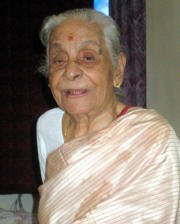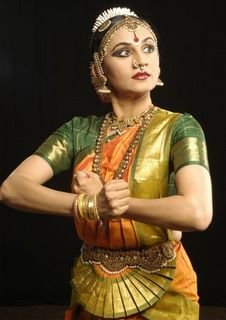
|   |

|   |
Muktamma’s centenary - Tapati Chowdurie e-mail: tapatichow@yahoo.co.in October 29, 2014 The popular song “Payyada paimeede jeri pavvalinchiyunde samiki” in Nadanamakriya ragam reminds a connoisseur of Carnatic music of the great singer of padams and javalis, T. Mukta, whose centenary was celebrated recently in Chennai by Nandini Ramani. Sangeet Natak Akademi, New Delhi, and Dr. V Raghavan Centre for Performing Arts, Chennai, presented Smriti Kusumanjali in a two-day event at the Bharatiya Vidya Bhavan. Incidentally Nandini, Mukta’s disciple for more than a decade, has also been trained in Bharatanatyam by Mukta’s equally famous cousin T. Balasaraswati.  T. Mukta
T. Mukta was one of the foremost exponents of Veena Dhanammal school of Carnatic music. T. Mukta and T. Brinda were not only one of the first women duo singers, but also the most popular one during their time. A recipient of the Sangeet Natak Akademi Award in 1973, Mukta was an authority on padams and javalis. She passed away at the age of 93 in 2007. The inaugural address of the festival was delivered by Nandini Ramani. She said that one of the fundamental aims of her centre was to carry forward and preserve oral traditions, and that in her endeavour, Dr. Raghavan Centre for Performing Arts was privileged with the pioneering help given by Leela Samson, then Chairman of SNA and the helping hand extended to her by Helen Acharya, Secretary, SNA. S. Janaki, Executive Editor of Sruti magazine, was the master of ceremonies. Speaker VAK Ranga Rao, dancer, music scholar, film historian, critic, orator all rolled into one, and one who has the largest collection of 78RPM records, rewarded the audience with a brief peep into the history of padams and javalis with anecdotes. Leela Samson congratulated Nandini Ramani for carrying on this herculean task of “celebrating the work of a great atma” single-handedly. Malathi Rangaswamy, Vice President, Music Academy, felicitated Mukta’s daughter Lakshmi Ratnam and spoke of the need for both dancers and singers to keep the tradition alive. Abhinaya guru Kalanidhi Narayanan was honoured at the festival and her expressive eyes lit up when she said that she had the privilege of learning from Muktamma and her mother. Dr. Nirmala Sundarajan who learnt under Muktamma spoke about the minute details that her guru delved into, thereby providing a glimpse of her guru’s eye for perfection. She and her daughter Dr. Subhasini Parthasarathy sang a few padams and javalis used in Bharatanatyam performances. Prior to these, a short film on the legendary musician was screened, followed by a floral homage to T. Mukta by dignitaries.  Uma Vasudevan
Mukta’s granddaughter and disciple Uma Vasudevan, who is also a disciple of Rajaratnam and Kalanidhi Narayanan, danced to the padams and javalis sung by Muktamma herself. In her recorded voice, she sang a Kshetrayya padam in ragam Panthuvarali and talam rupakam “Yarukkagilum bhayama”, in which the heroine says that she is not afraid to be in a relationship. The javali in raag Behag and rupaka talam by Pattanam Subramanian Iyer, where the heroine is going to meet her paramour and is not afraid, was followed by the javali “Smara sundaranguni” in ragam Paras and talam adi composed by Dharmapuri Subbarayar. It was a treat for connoisseurs and dance lovers assembled there. On the second day there were a series of lecture- demonstrations by VAK Ranga Rao, Ritha Rajan, Subhashini Parthasarathy and Madhavi Rajagopalan. Leela Samson released the book Tamizh Padams compiled by Madhavi Rajagopalan, who spoke on ‘Padams in regional languages of South India.’ Dr. Ritha Rajan lectured on her well researched paper ‘Javali - form and content.’ Subhasini Parthasarthy spoke on the lesser known composers of padams. Dr. Padma Subrahmanyam, who was the Chief Guest on the second day gave the valedictory address, held Muktamma in deep reverence and said that Muktamma was a part of a banyan tree. The performances of the day included a group rendering of padams and javalis by SNA trainees – students of R. Vedavalli, Arti Ratipriya, Archana and Suchitra. This training program is SNA’s endeavour to preserve and transmit the arts from one generation to the next. Smriti Kusumanjali concluded with a musical homage ‘Ganamrta Muktavali’ by S. Sowmya, a disciple of T. Mukta, who sang a dozen songs starting with “Arunachalanathan” in ragam Saranga and rupaka talam by Muthuswami Dikshitar and ending with “Karuna jude” in ragam Sri and talam adi by Shyama Shastry, leaving the audience hankering for more. Muktamma is a precious pearl among musicians. Today if there is any musician who sings padams and javalis, it can be traced to the teaching of the sisters Brindamma or Muktamma. They have an illustrious sishya parampara including Semmangudi Srinivasa Iyer, M.S. Subbalakshmi, Ramnad Krishnan, R. Vedavalli and many others. Their fame and name as musicians drew a lot of eager students and fortunately they have left their imprint on a vast number of musicians. Muktamma’s music was listening based. In fact, although padams are notated, it is almost impossible to sing a padam by merely looking at the notation unless one has learnt it from a guru. The title of Sangita Kalacharya from Music Academy, Madras, the Sangeet Natak Akademi Award, New Delhi and the Sangita Ratnakara award at Cleveland were conferred on her late in life. On her 90th birth anniversary, when she was having frequent memory lapses, she was taken to a sabha, but when she was requested to sing, she remembered every line of her song. Tapati Chowdurie learnt dance for almost 10 years from Guru Gopinath in his dance institution Natana Niketan in Madras. For a brief period, she was with International Centre for Kathakali in New Delhi. Tapati has a Master's degree in English Literature and Bachelor's degree in Education. She has a regular column in The Statesman, where she writes on dance and music. She also writes for The Hindu and Sruti. Presently, she is a freelance writer. |